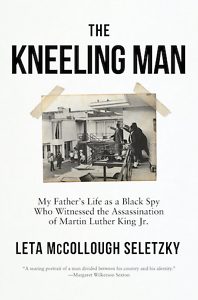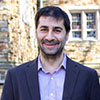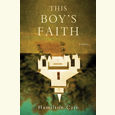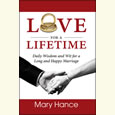Extinguishing Shadows
Leta McCollough Seletzky’s The Kneeling Man explores the complex story behind an iconic photograph
In the iconic photograph from April 4, 1968, six men are on the balcony of the Lorraine Motel in Memphis. Martin Luther King Jr. is lying in a pool of blood. Four others point up at the boardinghouse from where a shot rang out. The sixth man — kneeling over King, tending to him — is Marrell “Mac” McCollough, who portrayed himself as a member of the Invaders, a local Black Power group. In fact, McCollough was an undercover officer for the Memphis Police Department. His daughter, Leta McCollough Seletzky, tells his story in The Kneeling Man. She digs deep and casts wide. Part history, part memoir, part meditation on race and America, the book is a gripping account of a complicated city in a tumultuous moment, with implications into the present day.

Seletzky’s article in O, The Oprah Magazine, “The Man in the Picture,” was selected as a Notable Essay in Best American Essays 2019. She also has written for The Atlantic, The New York Times, and The Washington Post. She answered questions via email from Chapter 16.
Chapter 16: How did your father end up on the balcony of the Lorraine Motel when Martin Luther King Jr. was assassinated? Was it due more to his personal choices or to political forces?
Leta McCollough Seletzky: I’ve found it difficult to disentangle his personal choices from the political forces that placed him on that balcony. His own agency can’t — and shouldn’t — be denied. He chose to enlist in the military, then join the police department, then perform the undercover work within the department that led to his presence at the scene of the assassination. He elected a path that led to the hope for a better life under oppressive circumstances that regularly and systematically crushed the dreams of Black Americans.
But social, economic, and political forces laid that path and foreclosed others. His only way to higher education was the G.I. Bill, which required military service. And one of the few professions his military service qualified him for was law enforcement — and even that had been a long shot, given that the Memphis Police Department hired relatively few Black officers then. As one of those few Black officers, and a rookie at that, he was no match for the political forces calling for the infiltration of Black militant groups and other social activist organizations.
Chapter 16: The Kneeling Man emphasizes that McCollough believed in the Black freedom struggle of the 1960s. How did he square his political sympathies with his surveillance activity?
 Seletzky: I’m not sure he did, at least not for many years. His work in law enforcement, much like his military service, required him to separate his personal feelings from the performance of his duties. In a sense, he had to bifurcate himself, a predicament that culminated in the bifurcation of his very identity as Marrell the Black militant and Mac the undercover police officer. It was only after retiring from his career at the CIA that he could begin to reintegrate the parts of himself that he’d previously kept separate, pursuing social justice through protest and working on political campaigns.
Seletzky: I’m not sure he did, at least not for many years. His work in law enforcement, much like his military service, required him to separate his personal feelings from the performance of his duties. In a sense, he had to bifurcate himself, a predicament that culminated in the bifurcation of his very identity as Marrell the Black militant and Mac the undercover police officer. It was only after retiring from his career at the CIA that he could begin to reintegrate the parts of himself that he’d previously kept separate, pursuing social justice through protest and working on political campaigns.
Chapter 16: In the narrative accounts of the sanitation workers’ strike and King assassination, the Invaders have been cast as both violent troublemakers and heroic disciples of Black Power. When seen through your father’s eyes, how should we understand the Invaders?
Seletzky: Overall, he saw them as a small group of young people — some capable and well-meaning, some idealistic and bombastic, and others scofflaws and petty criminals — who gathered to talk radical politics and in some instances use or even occasionally sell drugs. In his view, the group as a whole was neither violent nor particularly troublemaking, nor were they heroes. They were young Black people searching for meaning, purpose, and identity, in some cases making the mistakes that all too often accompany that search.
Chapter 16: McCollough later worked for the CIA. Did race create professional opportunities for him, or did it limit him?
Seletzky: I think race created far more obstacles than it did opportunities for him there. Of course, it was his successful infiltration of the Invaders — made possible by his race — that helped him gain the credentials to pursue a career in intelligence. But once he embarked on that career, he found the same kinds of discrimination and exclusion that existed in most American workplaces. Though he participated in, and at times pioneered, efforts to break down these barriers, his endeavors arguably stymied his career.
Chapter 16: Your father is a central figure in conspiracy theories about King’s assassination. How has he reckoned with those accusations?
Seletzky: For a long time, I don’t think he did, and this goes back to that bifurcation of self that I mentioned earlier — his separation of personal feelings from duty. His career in intelligence prevented him from openly confronting these accusations, and my sense is that he set the matter aside in his mind and focused on the duties before him. But the process of revealing his story and exploring its themes and contours seems to have sparked a reckoning for him. In publicly affirming truths he’d previously kept to himself, he seems to have settled into those truths, extinguishing shadows cast by falsehoods.
Chapter 16: The Kneeling Man tells your story, too. How did researching and writing this book shape your understanding of your father? Of yourself? Of Memphis?
Seletzky: Researching and writing this book helped me know who my father is, in the fullness of his humanity. Where I once felt dread about what I didn’t know about him, I now feel awe. And in a similar vein, I better understand Memphis in all its complexity. All this has helped me more fully know myself. Like Dad, I’ve reckoned with truth and falsehood and extinguished shadows.

Aram Goudsouzian is the Bizot Family Professor of History at the University of Memphis. His most recent book is The Men and the Moment: The Election of 1968 and the Rise of Partisan Politics in America.





